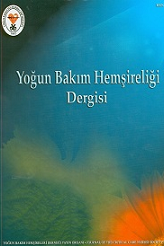Akut Respiratuar Distres Sendromlu Yenidoğanın Bakımı
Akut respiratuar distres sendromu (ARDS), özellik- le prematüre ve düşük doğum ağırlıklı bebeklerde, septik şok, aspirasyon, perinatal asfiksi, sürfaktan eksikliği vb. durumlarda ortaya çıkan ciddi bir tab- lodur. ARDS’li yenidoğanlara yoğun bakım orta- mında, yüksek riskli yenidoğanın tedavi ve bakımı yapılır. ARDS’li yenidoğanın bakımı, yoğun bakım ekibinin multidisipliner titiz yaklaşımıyla yapılır. Bu yenidoğanların iyileşmesinde, hemşirelik bakımı önemli bir yer tutar. ARDS’li yenidoğanın hemşire- lik bakımı ile ilgili yapılmış araştırmalar ve literatür bilgileri sınırlıdır. Bu yazının amacı ARDS’li pediat- rik hastalarda hemşirelik bakımındaki değişiklikleri değerlendirmektir
Anahtar Kelimeler:
Yenidoğan, akut respiratuar distres sendromu, bakım
Care of Newborn with Acute Respiratory Distress Syndrome
Acute respiratory distress syndrome (ARDS) is a serious condition which appears especially in premature babies or babies with low birth weight in situations like septic shock, aspiration, perinatal asphyxia, lack of surfactant. The newborn with ARDS is maintained like high risky newborn under intensive care conditions. The care of newborn with ARDS is based on meticulous, multidisciplinary, intensive care team approach. The nursing care has an important place for the cure of this newborn. There are limited research and literature information about nursing care of a newborn with ARDS. The purpose of this article is to evaluate the changes in nursing care to pediatric patients with ARDS
Keywords:
Newborn, acute respiratory distress syndrome, care,
___
- Yüksek riskli yenidoğan ve hemşirelik bakımı. In: Çavuşoğlu H. Çocuk sağlığı hemşireliği. 8. baskı. 2. Cilt. Ankara: Çağın Basın Yayın; 2008. s. 57-116.
- Hyalin membran hastalığı. In: Kavaklı A, Pek H, Bahçecik N. Çocuk hastalıkları hemşireliği. 2. baskı. İstanbul: Çevik Matbaacılık; 1998. s. 238-47.
- Şevketoğlu E. Akut solunum sıkıntısı sendromu. Güncel 2006;1:12-9.
- Aslan AT, Doğru D, Özçelik U. Akut respiratuar dis- tres sendromu. Çocuk Sağlığı ve Hastalıkları Dergisi 2004;47:209-21.
- Nursing planing, intervention, and evaluation for altered respiratory functions. In: Jackson DB, Saunders RB, editors. Child health nursing, a com- prehensive approach to the care of children and their families. Philadelphia: J.B. Lippincott Company; 1997. p. 897-977.
- Ovalı F. Solunum sıkıntısı ve respiratuar distress sen- dromu. In: Dağoğlu T, Ovalı F, editörler. Neonatoloji. İstanbul: Nobel Tıp Kitapevleri; 2007. s. 331-46.
- McCormick J, Blackwood B. Nursing the ARDS patient in the prone position: the experience of qualified ICU nurses. Intensive Crit Care Nurs 2001;17:331-40.
- Küçüködük Ş. Yenidoğan ve hastalıkları. Ankara: Feryal Matbaası; 1994.
- Schulte EB, Price DL, James SR. Pediatric nursing. London: W.B. Saunders Company; 1997.
- Sabogal C, Talmaciu I. Bronchopulmonary dysplasia (chronic lung disease of infancy). In: Panitch HB, editor. Pediatric pulmonology; the requisites in pediatrics. Philadelphia: Mosby; 2005. p. 60-74.
- Anderson MR. Update on pediatric acute respira- tory distress syndrome. Respir Care 2003;48:261-76.
- Carpenito-Moyet LJ. Hemşirelik tanıları el kitabı. Çev: Erdemir F. İstanbul: Nobel Tıp Kitabevi; 2005.
- Atmaca D. Yüksek riskli yenidoğan (prematür ve respiratuar distres sendromu). 13. Neonatoloji -Yenidoğan Hemşireliği Kongresi; 13-17 Nisan 2005, Kayseri. s. 404-8.
- Relvas MS, Silver PC, Sagy M. Prone positioning of pediatric patients with ARDS results in improve- ment in oxygenation if maintained > 12 h daily. Chest 2003;124:269-74.
- Chiumello D, Cressoni M, Racagni M, Landi L, Li Bassi G, Polli F, et al. Effects of thoraco-pelvic sup- ports during prone position in patients with acute lung injury/acute respiratory distress syndrome: a physiological study. Crit Care 2006;10:R87.
- Ball C, Adams J, Boyce S, Robinson P. Clinical guide- lines for the use of the prone position in acute respi- ratory distress syndrome. Intensive Crit Care Nurs 2001;17:94-104.
- Özyurt Y, Erkal H, Demirhan R, Arıkan Z. Akut respiratuar distres sendromu (ARDS). Türk Göğüs Kalp Damar Cer Derg 2002;10:126-30.
- Aslan AT, Doğru D, Özçelik U. Akut respiratuar dis- tres sendromu. Çocuk Sağlığı ve Hastalıkları Dergisi 2004;47:209-21.
- Cameron JI, Herridge MS, Tansey CM, McAndrews MP, Cheung AM. Well-being in informal caregivers of survivors of acute respiratory distress syndrome. Crit Care Med 2006;34:81-6.
- ISSN: 1302-0498
- Başlangıç: 1997
- Yayıncı: Yoğun Bakım Hemşireler Derneği
Sayıdaki Diğer Makaleler
Diyabet ve Yoğun Bakım Hastası
Yoğun Bakım Ünitesinde Yatan Hastaların Deneyimleri
Sevilay HİNTİSTAN, Nesrin NURAL, Havva ÖZTÜRK
Kardiyoloji Yoğun Bakım Hemşireliğinde Etik
Yoğun Bakım Ünitesinde Uygulanan Sürekli Renal Replasman Tedavileri
Akut Respiratuar Distres Sendromlu Yenidoğanın Bakımı
Transfer Anksiyetesi; Yoğun Bakım Hastası ve Ailesinin Ortak Duygusal Deneyimi
